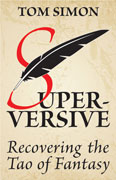A sombrero fell out of the sky and landed on the main street of town in front of the mayor, his cousin, and a person out of work. The day was scrubbed clean by the desert air. The sky was blue. It was the blue of human eyes, waiting for something to happen. There was no reason for a sombrero to fall out of the sky. No airplane or helicopter was passing overhead and it was not a religious holiday.
—Richard Brautigan, Sombrero Fallout
This is a good way of hooking a reader: we want to know where that sombrero came from. But it does contain a wasted sentence, thrown in, apparently, in a failed attempt to provide ‘atmosphere’:
It was the blue of human eyes, waiting for something to happen.
That line is simply a cheat. One technique that bad writers use fairly often, and even good writers may fall back on despite themselves, is fake evocation – communicating mood by phony description. Instead of describing a thing and allowing it to suggest a mood to the reader, they flatly state what the mood is supposed to be and pretend that the thing described evokes it. It’s lazy, it’s a swindle against the reader, and it deserves no praise.
In the instant case, it appears to me that Mr. Brautigan (or, rather, the character who is writing the story-within-a-story that begins with this passage) wanted to shoehorn an expectant mood into the passage, so he looked for a place where he could plausibly insert the phrase ‘waiting for something to happen’. He did this by attaching it to a bit of physical description that, by itself, would do absolutely nothing to evoke such a mood, and then relying upon artistic licence to make readers (and critics) let him get away with it.
Incidentally, to say that eyes are sky-blue is descriptive, because sky-blue is a fairly definite colour. To say that the sky was eye-blue is just silly, because blue eyes are not all alike.
For what it’s worth, I’ve written about this at somewhat greater length in ‘Teaching Pegasus to crawl’.
(Reposted, with edits, from a comment thread on The Passive Voice.)









Recent Comments